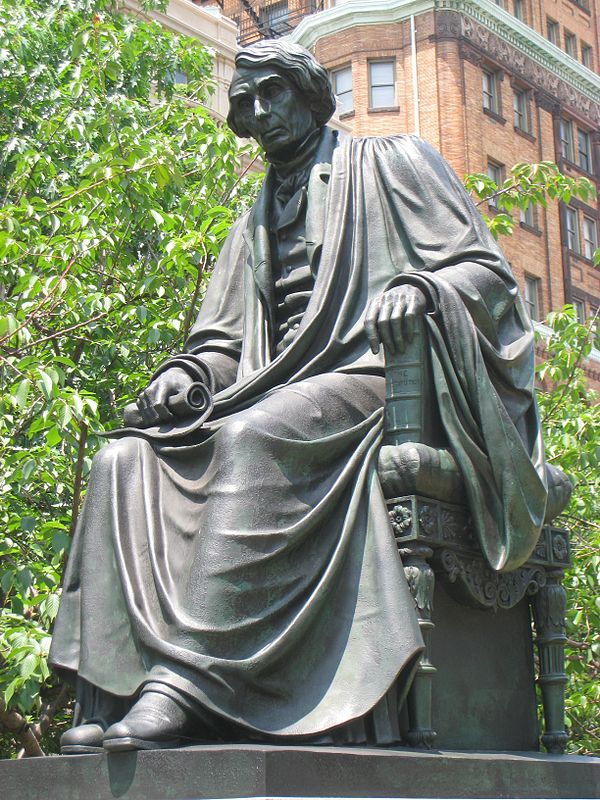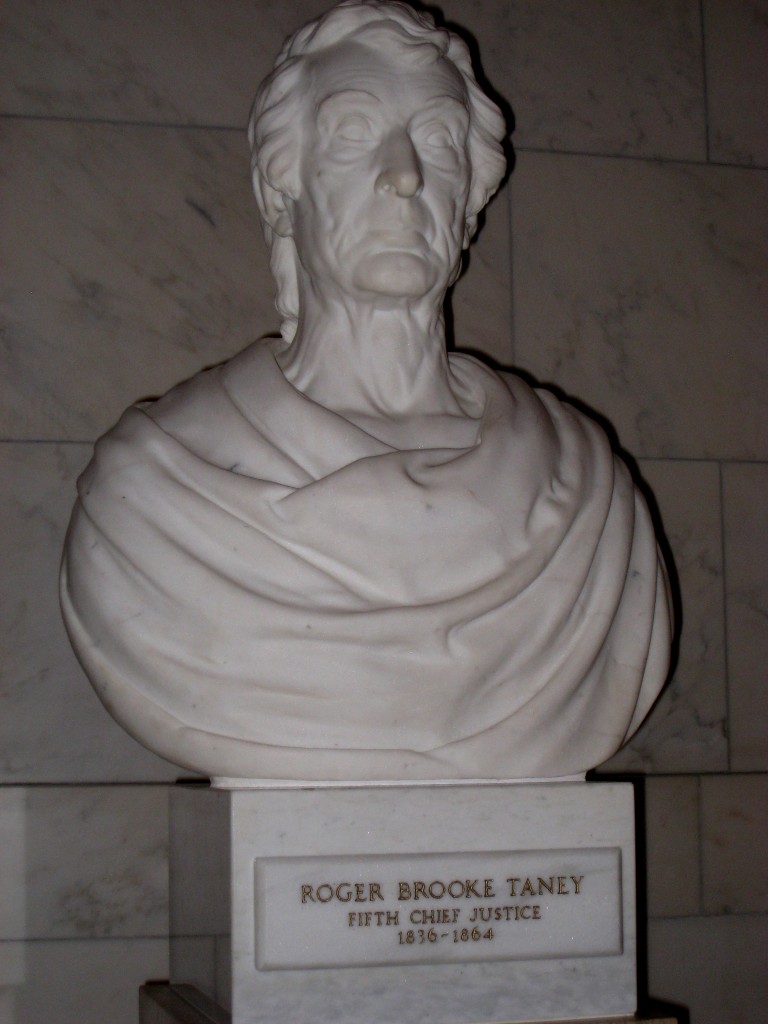 Baltimore has voted to remove the statute of the only Marylander to serve as Chief Justice, Roger B. Taney. The proposal came from UMaryland LawProf Larry Gibson:
Baltimore has voted to remove the statute of the only Marylander to serve as Chief Justice, Roger B. Taney. The proposal came from UMaryland LawProf Larry Gibson:
University of Maryland law professor Larry S. Gibson, a commission member, proposed the plan to remove the Roger B. Taney Monument on Mount Vernon Place and the Robert E. Lee and Thomas J. “Stonewall” Jackson Monument in the Wyman Park Dell.
Gibson said Taney’s statute should be dismantled because his authorship of the Dred Scott decision was “pure racism.” The decision held that African-Americans could not be American citizens.
“In my view, he deserves a place in infamy,” Gibson said of the fifth chief justice of the Supreme Court.
Although Taney, a Marylander, was not a Confederate fighter, his authorship of the Dred Scott decision brought him into the commission’s purview. Gibson argued the Baltimore statue is merely a copy of a monument that sits in Annapolis.
Members of the Commission wrote that the statue of Taney was even worse than those of Robert E. Lee and Stonewall Jackson.
“Roger B. Taney is a monument that symbolizes racism,” said commission member Donna Cypress, director of library services at Lincoln College of Technology and member of Maryland Commission on African American History and Culture.
“The Taney monument is the most offensive,” said commission member Mary Demory, who serves on the Baltimore City Public Arts Commission.
As I noted in October, after a bust of Taney in Frederick, MD was vandalized, this issue will eventually come to the Supreme Court.
Lining the Great Hall of the Supreme Court are busts of the Chief Justices. Sandwiched between the great visages of John Marshall (the 4th Chief) and Salmon Chase (the 6th Chief) is the blank stare of Roger Brooke of Taney.

Will we one day see a movement to remove the bust of Chief Justice Taney from the Supreme Court? So far, the Court has kept a depiction of Moses and the Ten Commandments, even though it arguably conflicts with McCreary County v. ACLU. There is also a depiction of Muhammad in the Court, although a fatwah “laid [the issue] to rest.”
But what about Taney? Would a majority of the Justices vote to eliminate the Taney bust? My guess it that Chief Justice Roberts would not, as it sets a dangerous precedent to expunge all things offensive from the Supreme Court’s lore. More likely than not, Justice Breyer will dissent from that order, like he dissented from the order sealing the front door.
If we get rid of Taney, we should also consider his predecessor. I am waiting for the movement to dismantle John Marshall’s statue for his discussion of Native Americans in Johnson v. M’Intosh.
But the tribes of Indians inhabiting this country were fierce savages whose occupation was war and whose subsistence was drawn chiefly from the forest. To leave them in possession of their country was to leave the country a wilderness; to govern them as a distinct people was impossible because they were as brave and as high spirited as they were fierce, and were ready to repel by arms every attempt on their independence.
What was the inevitable consequence of this state of things? The Europeans were under the necessity either of abandoning the country and relinquishing their pompous claims to it or of enforcing those claims by the sword, and by the adoption of principles adapted to the condition of a people with whom it was impossible to mix and who could not be governed as a distinct society, or of remaining in their neighborhood, and exposing themselves and their families to the perpetual hazard of being massacred.
…
That law which regulates and ought to regulate in general the relations between the conqueror and conquered was incapable of application to a people under such circumstances. …
So, too, with respect to the concomitant principle that the Indian inhabitants are to be considered merely as occupants, to be protected, indeed, while in peace, in the possession of their lands, but to be deemed incapable of transferring the absolute title to others.
This gratuitous language (which does not seem to bother people) is on par with Taney’s discussion of Africans in Dred Scott, and Justice Harlan’s discussion of Chinese people in his Plessy Dissent (people look past that too).
The entire premise of Marshall’s opinion was that Indians were incompetent to make any land contracts because they were not civilized people. The reason why Marshall wrote the opinion in as brutal language as he did, was to make clear that even if you disagreed with him about acquisition by discovery or conquest, the Indians were incompetent to make any manner of contracts, so they could not enforce their rights in Court.
The decision also served an instrumentalist purpose. In much the same way that Taney wrote Dred Scott as a means to avert a Civil War (it didn’t work), Marshall wrote Johnson as a way to promote westward expansion of the Americas. If the Indians were able to alienate property, then the settlers would face a serious legal impediment to manifest destiny. Marshall’s opinion also didn’t work, as the premise of allowing the Indians to merely “occupy” but not own the land faltered as settlements pushed westward, and the Trail of Tears inflicted mass carnage on the native populations.
As Chief Justice Rehnquist noted in his dissent in U.S. v. Sioux Nation:
That there was tragedy, deception, barbarity, and virtually every other vice known to man in the 300-year history of the expansion of the original 13 Colonies into a Nation which now embraces more than three million square miles and 50 States cannot be denied.
Marshall’s opinion in Johnson all but insured that the Indians could not seek any redress in courts for the plundering of their property. Perhaps Marshall atoned somewhat in Worcester v. Georgia, but is there no outrage at how the Great Chief Justice reduced aboriginal populations to infantile savages.
As another side note, I taught Johnson this morning in Property. I found myself inadvertently referring to CJ Marshall as CJ Roberts. This happened maybe 5 or 6 times, so I had to explain to my bemused students about Roberts and Obamacare on the first day of class. I suppose I see them on the same wavelength. Not a fan of either’s twistifications.
Final aside, Taney does not get nearly enough credit for Ex Parte Merryman, notwithstanding Seth Barrett Tillman’s challenging of the conventional wisdom.